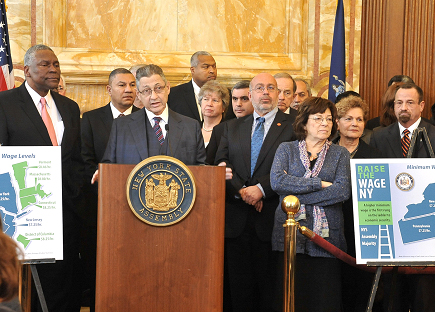
The Remarks Of Speaker Sheldon Silver
Announcing Introduction Of Legislation
To Increase The Minimum Wage
Capitol, Speaker's Conference Room
Monday, January 30, 2012 [1 pm]

Assembly Speaker Sheldon Silver (at podium) and Labor Committee Chair Keith Wright (Speaker's right) announced the introduction of legislation to raise the minimum wage to $8.50 at a Capitol news conference. Silver said his conference feels very strongly about the bill saying, "We must rekindle the spirit of shared prosperity and dignity of hard work. It is time to raise the minimum wage."
The Speaker and Wright were joined by members of the Assembly majority and labor advocates, including Assembly members Philip Ramos, Samuel Roberts, Barbara Lifton; Robert Reilly, Guillermo Linares, Rhoda Jacobs, Ellen Jaffee and Harry Bronson; and New York State AFL-CIO President Mario Cilento and Retail, Wholesale and Department Store Workers Union President Stewart Appelbaum.
In 1938, President Franklin Delano Roosevelt signed into law the landmark Fair Labor Standards Act. The Act established a national minimum wage for the purposes of reducing poverty and giving LIFE to the American Dream. Seventy-four years later, that noble purpose is in peril.
Corporate profits of low-wage employers are soaring while the wages of working people remain stagnant or are eroding in value.
The latest Census data indicates that nearly one in two Americans have fallen into poverty or have joined the ranks of the working poor.
According to the 2010 Census, the poverty threshold for a parent with two children was $17,568 a year.
Today, a parent working a full-time, 35-hours-a-week, minimum wage job earns a little more than $13,000 a year. This parent is literally trapped in a hopeless cycle of poverty.
It is imperative that we rekindle the spirit of shared prosperity and restore the dignity of work. One way we can do this is by raising the minimum wage.
I am pleased to announce that today, the Chair of our Labor Committee, Assemblyman Keith Wright and I have introduced legislation to increase New York State's minimum wage.
Standing in support of the legislation are its co-sponsors, the members of the Assembly Majority. We are also joined by three special guests, some of whom you will be hearing from in a few moments.
We are honored to be joined by:Mario Cilento, who joined the New York State AFL-CIO in 1992 and with proven leadership, has risen through the ranks to become its President;
Stuart Appelbaum, President of the one-hundred-thousand member Retail, Wholesale and Department Store Workers Union. Stuart is a longtime champion of working men and women, and a labor leader who is widely respected for his work at both the state and national levels;
And Karen Scharff, Executive Committee Co-Chair of the Working Families Party of New York State.
Our legislation would also index it to the rate of inflation in order to ensure that the real value of New York's minimum wage does not erode as the cost of living rises.
We estimate that an enhanced minimum wage would benefit more than a million New Yorkers; putting much-needed cash in their pockets and providing direct relief to working families who need it most.
Raising the minimum wage helps those who are striving to help themselves and in the process, gives a boost to local economies.
Studies show that minimum wage earners spend their extra dollars immediately in their corner stores, local pharmacies and neighborhood restaurants, thereby spurring economic growth and creating jobs.
Equally important, rigorous research conducted by economists in 2010, has debunked the myth that raising the minimum wage has caused job loss.
Our challenge is to raise it high enough to improve the standard of living without negatively affecting the economy. It is a balancing act and right now, New York State is out of balance.
Today, the District of Columbia and 18 states, including Connecticut, Massachusetts and Vermont have higher minimum wage rates than does New York.
Ten states index their minimum wages. Had New York's minimum wage kept pace with inflation since the 1970s, it would be $10.80 an hour today.
Instead, it's stuck at $7.25, and has increased just ten cents in the last six years.
As working people's purchasing power continues to erode, the question is no longer whether a worker or a family can live on the minimum wage, it's whether they can survive on the minimum wage and this is why it must be indexed.
Economic arguments aside, this is ultimately a matter of human dignity.
No one who works hard and follows the rules should be poor and bereft of hope in the United States of America.
No working parent should have to choose between paying the rent and buying food; between keeping the lights on or purchasing clothing for their children to wear to school.
We must rekindle the spirit of shared prosperity and the dignity of hard work. It is time to raise the minimum wage.